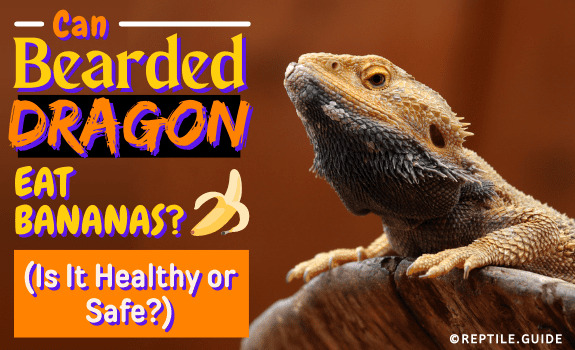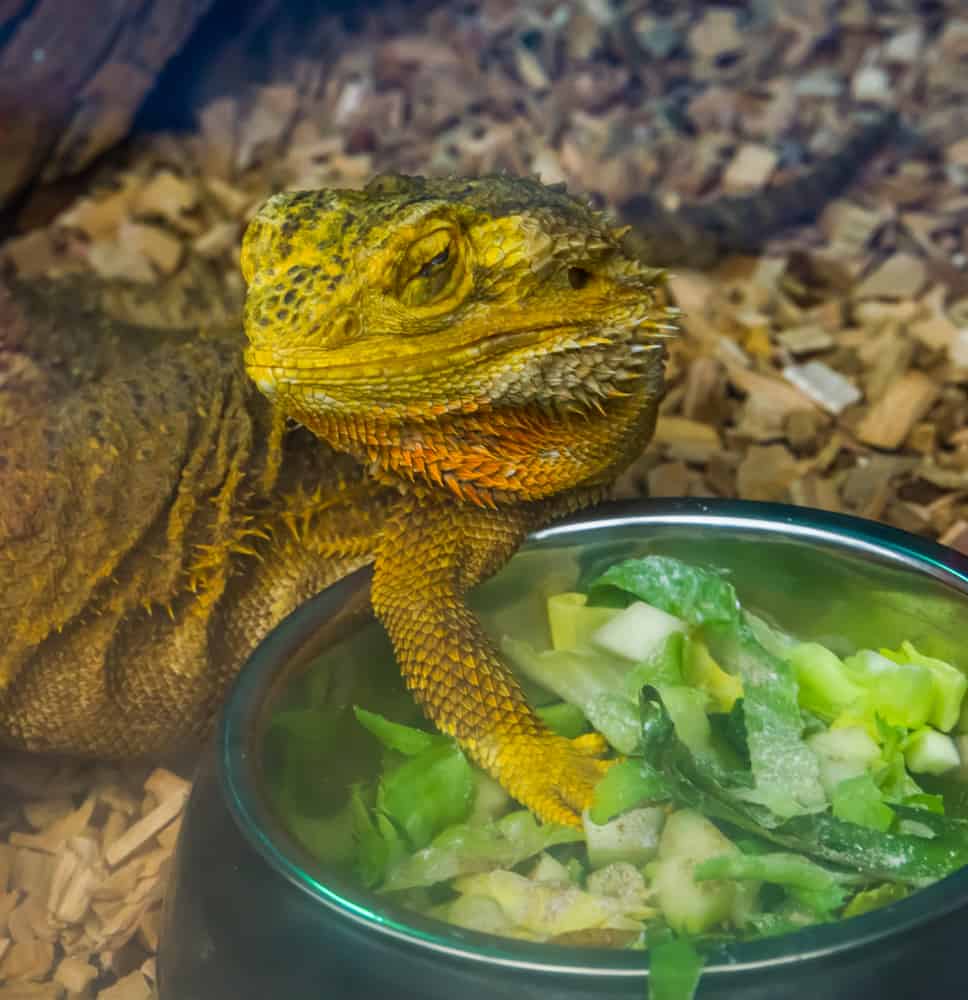Yes, bearded dragons can eat bananas in small amounts. Bananas add important vitamins and minerals to a bearded dragon’s diet, but too many bananas can cause problems for your beardie.
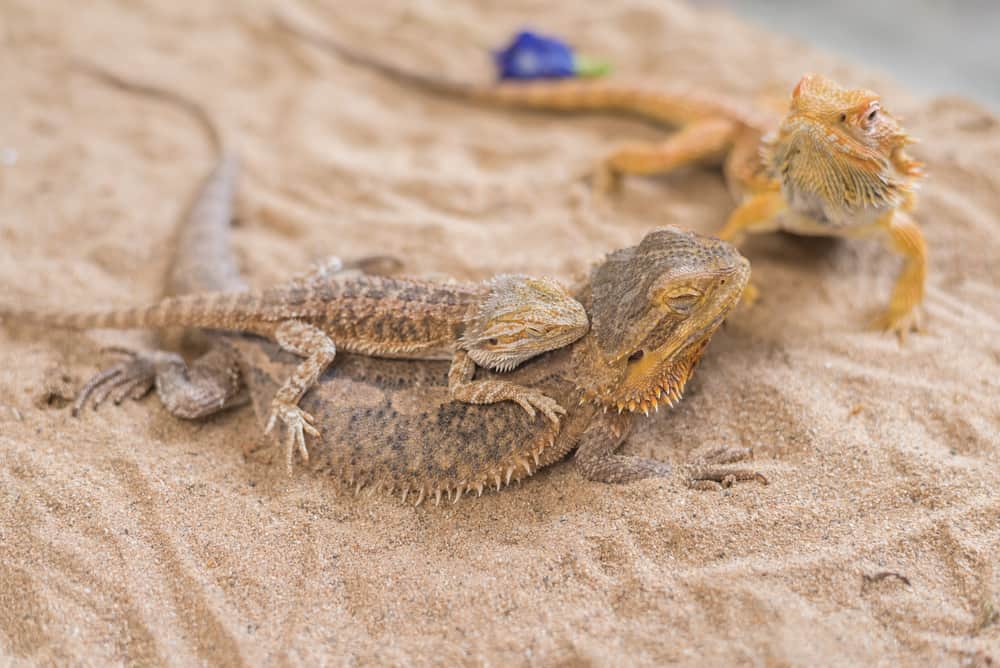
These fruits are high in sugar and contain too much phosphorus. Bananas are healthy in small amounts but not safe when given every day.
In This Article
Can Bearded Dragons Eat Bananas as Adults?
Adult bearded dragons can safely eat bananas but NOT often. Use chopped banana as an occasional treat (once or twice a month) as part of your dragon’s diet.
Bananas contain vitamins and minerals and are nutritious for bearded dragons.
Expert Tip: Always use organic bananas to prevent exposure to pesticides.
You should feed 80% plant material to your adult bearded dragon. You should feed more vegetables and less fruit. Insects should make up the other 20% of an adult bearded dragon’s diet.
Don’t limit the plant material you feed to one fruit or vegetable. Feed a variety of green veggies with added fruits.
You can feed your bearded dragon a number of foods. Their diet should include live foods and plant material.
Can Bearded Dragons Eat Banana Leaves?
Bearded dragons can eat banana leaves. Ensure that the banana plant is organic to prevent exposing your beardie to pesticides.
The leaves of the banana plant contain vitamin B6 and fiber, which are beneficial for your bearded dragon.
Leaves are tough and can become a choking hazard. Cut leaves into small pieces. Feed 3 to 5 pieces that are cut into sizes no bigger than the distance between the skink’s eyes.
It’s better to feed bananas to your beardie than to feed leaves because the fruit has more nutrients.
Can Bearded Dragons Eat Banana Peels?
You CAN feed a bearded dragon banana peels (skins).
Banana peels contain healthy nutrients including:
- Vitamin B12
- Vitamin B6
- Carotenoids
- Polyphenols
- Protein
- Magnesium
In small quantities, peels can form part of a healthy diet for your bearded dragon.
Peels and leaves may be difficult for your dragon to eat since their textures are tougher than that of bananas.
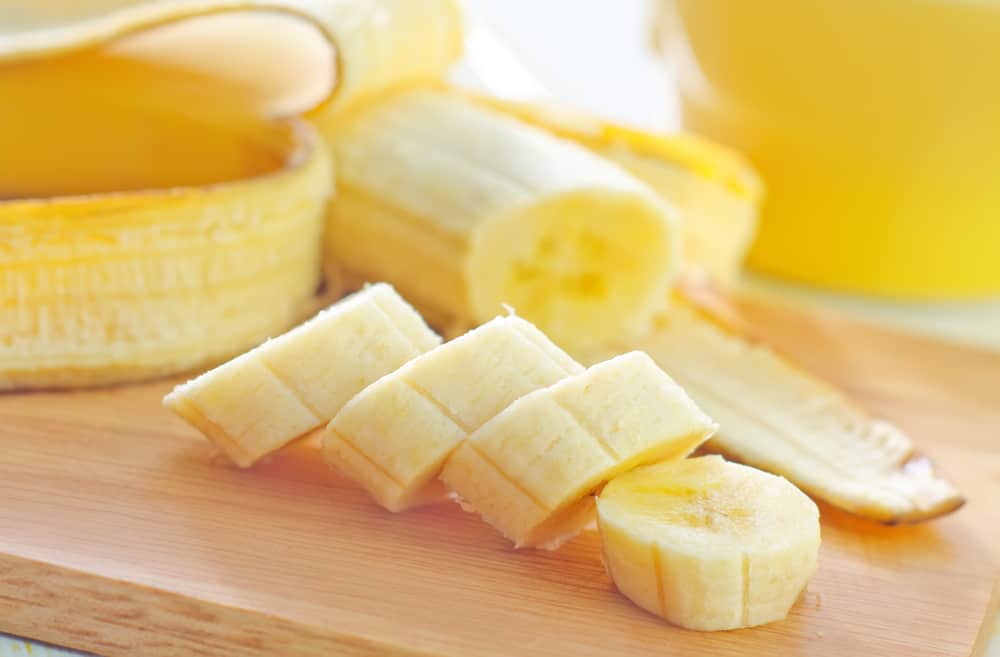
Can Baby Bearded Dragons Eat Bananas?
Only feed your baby bearded dragon a few bite-size small pieces of banana as a treat.
Young individuals need to eat more insects than plant matter. Feed baby bearded dragons a good diet with lots of insects!
In the wild, only half of a young bearded dragon’s diet is plant matter. The rest of their food is animal matter. Young animals grow fast and need added protein.
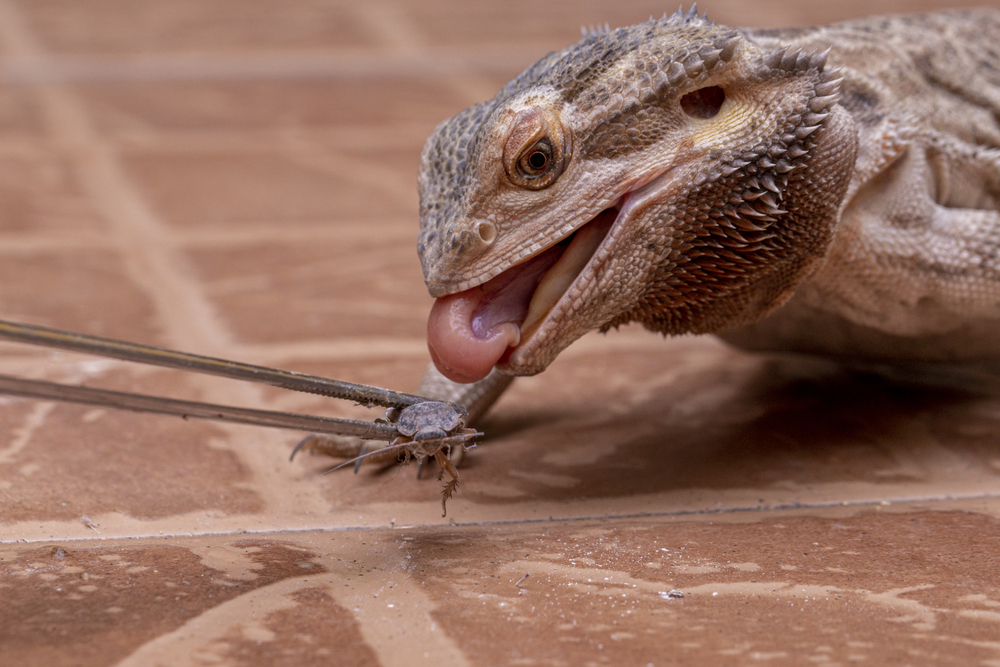
What Are the Health Benefits of Feeding Bearded Dragons Bananas?
Bananas are a rich source of nutrients. They contain healthy vitamins, minerals, and polyphenols.
Bananas contain antioxidant compounds. They help repair cell damage and reduce the chances of illness.
Vitamins A, C, and E are all examples of antioxidants. These vitamins and polyphenols protect cells from harmful molecules formed during chemical reactions.
Minerals are important for the skeleton and nervous systems.
The fiber in banana peels and leaves is also helpful in preventing constipation.
Ripe bananas contain more nutrients than unripe bananas. Unripe bananas have a higher starch content which makes them harder to digest for your bearded dragon.
Vitamins
Vitamins are organic micronutrients that are important for health. Food contains some but not all vitamins. Exposure to UVB light is needed for vitamin D3.
Bananas are rich in vitamin C. They also contain a small quantity of vitamin A and vitamin B6.
The peels contain some vitamin B12, another important B vitamin.
Bearded dragons only need small quantities of vitamins.
Below are the important functions of the different vitamins:
- Vitamin A – forms proteins needed in the eyes and keeps skin cells healthy
- Vitamin C – helps wound healing and immune system function, and is an antioxidant
- Vitamin B6 – helps the normal functioning of both the nervous and immune systems
- Vitamin B12 – is important in helping red blood cell formation and nervous system function
- Vitamin D3 – essential for bone and muscle formation and helps keep the immune system strong
Minerals
Minerals are essential inorganic micronutrients. Bananas contain many minerals that are necessary for survival and good health.
You may already know that bananas are rich in potassium, having 358 mg per 100 g. They also have quite a bit of magnesium at 27 mg per 100 g.
Below are the functions of the minerals in bananas.
- Magnesium – aids muscle contraction and keeps the immune system strong
- Iron – makes up part of the hemoglobin of red blood cells (helps carry the oxygen on the cells)
- Calcium – helps to build bones and is important for nerve cells to work properly
- Phosphorus – plays a role in making bones, helps muscles to contract, and helps to repair tissues in the body
- Potassium – an important electrolyte that aids nerve and muscle function, and regulates water balance
What Health Issues Arise From Eating Too Many Bananas?
You might not think bananas are bad, but bearded dragons have their own set of nutritional needs.
Bananas contain many healthy nutrients and minerals, but have too much sugar in them! Bananas also have too much of some minerals and not enough of others.
You probably know that people get fat if they eat too much sugar. This is also the case for a bearded dragon.
Bananas are a tasty food because they have a lot of natural sugar in them.
Fun Fact: A 100 g banana contains 12.23 g of sugar!
Sugar and Obesity
We know obesity is bad for our health. This is also the case for beardies. Too much sugar leads to obesity in bearded dragons.
Adults are quite sedentary in captivity. High sugar foods will make them fat. The problem is fat accumulates in the body. In bearded lizards, fat is also deposited in the liver. A beardie with a fatty liver is NOT a healthy animal. This illness is called hepatic lipidosis and can lead to death.
Tooth decay is another issue when you feed sugary food. Bananas get stuck on the teeth of your animal, which increases the rate of tooth decay.
You may wonder if you can feed your bearded dragon dried bananas. We do NOT recommend this. The sugar content of dried banana is even higher than in fresh fruit. Sugar is concentrated in dried bananas because water is removed.
Dried bananas have more fiber than fresh.We do not recommend banana chips and dried bananas.
It’s better to use banana leaves, peels, or veggies for fiber.
Metabolic Bone Disease (MBD)
Beardies need a 2:1 ratio of calcium to phosphorus.
Unlike spinach, bananas have the wrong ratio of calcium to phosphorus. The phosphorus ratio is too high relative to the calcium ratio.
Bananas have 22 mg of phosphorus and only 5 mg of calcium per 100 g.
This extra phosphorus prevents calcium absorption. Too much phosphorus in the diet causes problems!
Phosphorus blocks the absorption of calcium in the intestine, which results in calcium deficiency and, in turn, can lead to constipation and metabolic bone disease (MBD).
MBD happens in bearded dragons when they eat food that’s too high in phosphorus. It also occurs if they don’t get enough calcium and vitamin D3.
A lack of UVB radiation can also lead to MBD. Reptiles need exposure to UVB to make vitamin D3 (more about that in our bearded dragon lighting guide).
Vitamin D3 is important in bone formation.
Calcium and vitamin D3 work together to form bone tissue in the body.
MBD is a painful illness that’s challenging to treat.
Symptoms of MBD in bearded dragons include:
- Lack of appetite
- Lack of energy
- Twitching and shaking limbs
- Seizures
- Weak bones
- Soft face bones and soft jaw
- Fractures of bones
MBD is more likely in juveniles and breeding females. Ensure that egg-laying females get enough calcium.
Add calcium powder to food to get the correct ratio.
Don’t overfeed bananas!
How Do I Feed Bearded Dragons Bananas?
Prepare bananas by first washing well to remove any dirt or germs.
Slice the banana into small pieces. You can feed bananas with or without the banana skin.
Feed small banana pieces to prevent choking. Do this even when feeding a peeled banana. This also STOPS the bearded dragon from eating too much.
Some important points for feeding are as follows:
- Buy organic bananas.
- Use a clean food dish.
- Give only a few pieces of banana.
- Feed only tiny pieces of banana to avoid choking.
- The smaller the animal the smaller the size of the food you should feed.
- Remove uneaten banana pieces.
Feed bearded dragons pieces of veggies and fruit in a clean food bowl.
How Much Banana Can I Give My Bearded Dragon?
Bearded dragons definitely mustn’t be given bananas every day.
Bananas should only be an occasional treat as part of the dragon’s diet. Never feed large quantities of bananas.
At most, feed your beardie a few slices of banana every second week. Place only a few pieces of banana into the feeding bowl.
You can also give beardies a frozen banana that has thawed out. Keep in mind that frozen bananas don’t have the same nutritional value as fresh bananas.
A balanced diet is vital and should include a variety of foods.
What Other Fruits Can a Beardie Eat?
While you can feed other fruits to your bearded dragon, less than 20% of the plant matter in your bearded dragon’s diet should consist of fruit.
Some other fruits are also high in sugar so limit the quantity given. If you feed too much fruit your bearded dragon will overindulge causing health issues.
Fruit and vegetables have good nutritional value! They contain polyphenols, fiber, minerals, and antioxidants that promote health.
Fruits mixed with veggies ensure a balanced diet when added to other foods like live insects.
Remember that adults eat more plant matter than juveniles. Use a variety of vegetables and fruit as food.
As with bananas, avoid overfeeding any one particular fruit.
Many bearded dragon owners provide veggies and fruit as a healthy salad.
Other fruits with health benefits you can give in a food bowl:
- Apricots
- Apples
- Strawberries
- Kiwi fruit
- Raspberries
- Dates
- Figs
- Mango
- Guava
- Grapes
The answer to can bearded dragons eat bananas, is yes. Bananas have some beneficial nutrients.
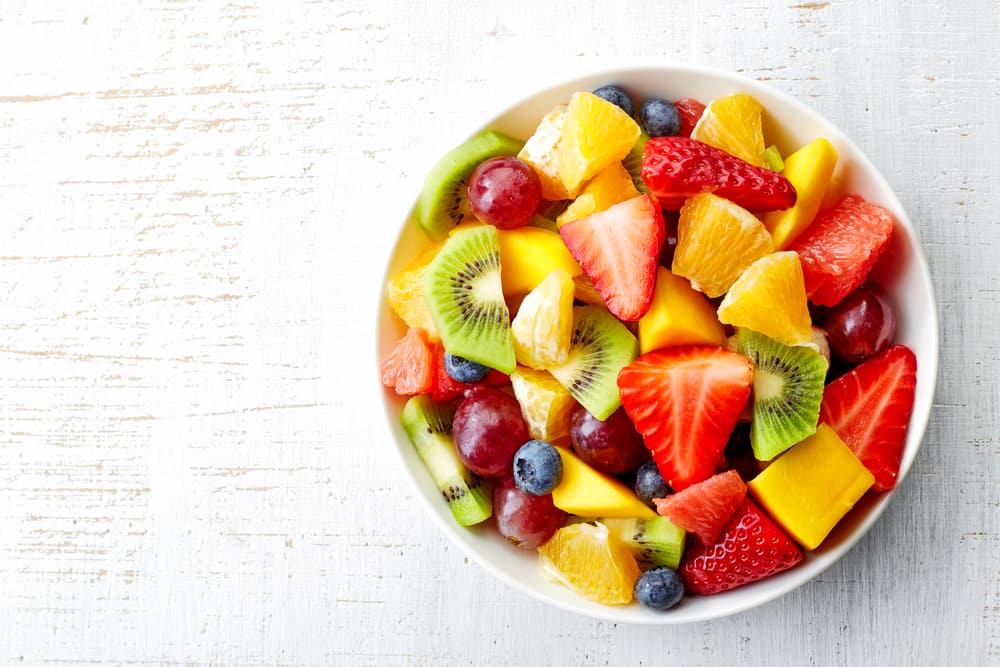
You can’t feed many bananas because of the high sugar content and incorrect balance of calcium and phosphorus.
Feeding your beardie bananas too often can cause health issues like obesity and MBD.
You should only feed banana pieces on rare occasions as a sweet treat.
You can learn more about caring for your bearded dragon by reading our bearded dragon care guide.
